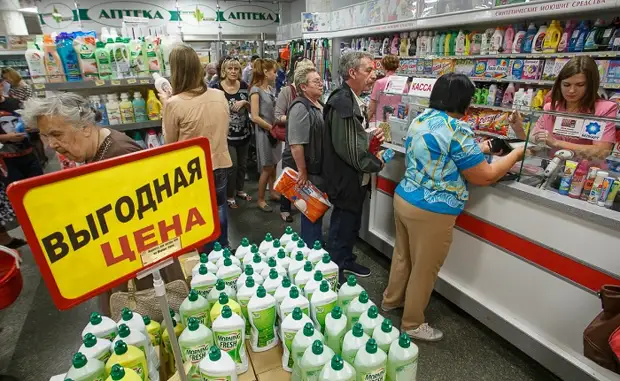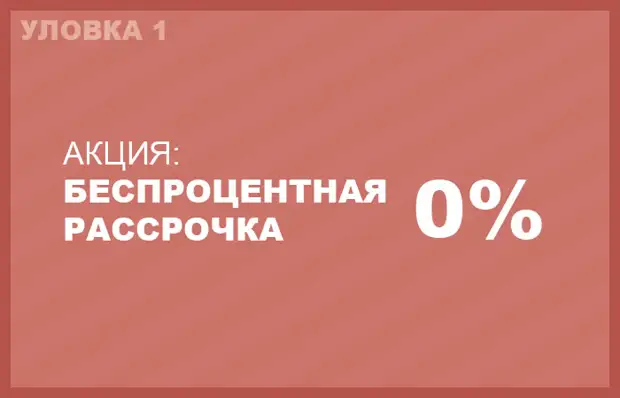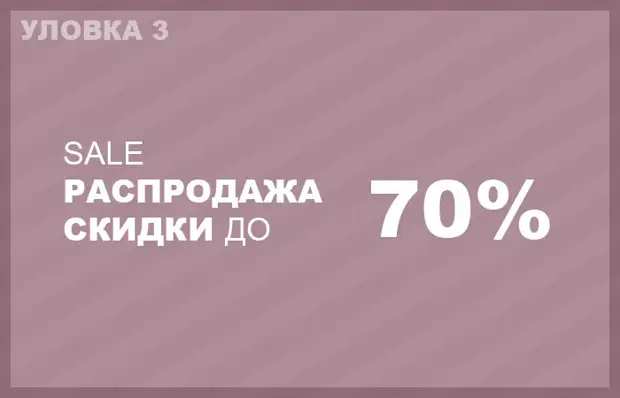
The expression "buy by action" firmly entered into the lexicon of a modern person. The profitability of some shares does not cause any doubt - for example, if the toothpaste is twice as long as the dental paste is twice as much as in all other cosmetic and hygienic discounters. But in the century of capitalism very often, only the tricks of marketers are hiding in large letters and favorable figures, and there is no real benefit for buyers. Material promotes the most popular marketer tricks.
In the business industry, discounts and promotions firmly occupied a niche of a peculiar chopsticks. To attract customers, used, for example, such adhesives, as discounts on loyalty cards, often such cards are money for the client. But these discounts, though they look like high, in fact - are quite meaningless, as they are doing on inadequate groups of goods that can be bought and without discounts, as they are bought quite rarely. As an example, discount on shoe cream. In addition, there are seasonal discounts, such as coal and brazing, and at the same time the main component is in this case, the kebab is more expensive than usual. There are imaginary discounts: first the price rises 100-300 percent, and then from this price tag drop 50 percent. We will discuss the most popular shares of cheating.
1. Interestable installment

The interest-free installments does not happen - it is always a percentage loan.
"The interest-free installment" is almost 100 percent of cases of trick of marketers. It is enough just to see how much in any other store there is a similar product when buying without installments. The price of a product in the store, where such an installment is offered, always overestimated. For example, we present the real example of the authors of Novate.ru, the cost of the Apple iPhone X 64GB smartphone in the salons of the Republic of Belarus. Buy model in the online store with a guarantee of 12 months can be equivalent to 1000 dollars. In the "interest-free installment", it is sold at the cost of equivalent of 1,500 dollars. Feel the difference!
2. Suppose limited amount of goods

Come on!
Is it possible to book a hotel room at Booking.com just because you saw on top of the announcement a red banner with the words "left only 2 places"? Or buy goods in the telemon shop after advertising with the words "Call Now, for the number of goods is limited"? This cunning marketer principle dates back to a simple demand and demand formula: the less often the goods, the more valuable. Back in 1975, British psychologists conducted special research with a group of volunteers. They offered people to evaluate cookies. In one bank, ten pieces were laid, and two more to the other. 90 percent of respondents said that cookies from the bank, where there were two pieces, tastier. But the trick was that the banks lay the same cookies. Sad, but the fact: when we see the words like "exclusive" or "limited edition", we cannot resist and buy goods.
3. Sales on the "Anchor" principle

Oh, these sales!
Did you think at least once, why is it so difficult to stay and not buy goods in your favorite mass market? Most likely, this phenomenon is associated with the so-called "anchor" effect, according to which people make a decision on the basis of the information initially received. In marketer becomes such information intentionally overestimated initial price per unit . For example, your favorite mass market, as a rule, puts the average price for a couple of jeans equivalent to an equivalent of $ 35, but on sale only two weeks after the release on sale they are already standing for $ 20! Our brain receives a signal: "What awesome discount, you need to take!" "Anchor" - the main course of marketers: an overestimated price is established at the start of sales, and then the real price of the goods, which is served as a discount with bright and catchy price tags with the "%" icon (for example, red).
Note: Such a fraudulent sale is called "Polish Sail".
4. Promotion "Gift when buying"

Gifts included in the price of your goods.
Some time ago, the streets of the cities have finished the printed flags of one network of Chinese goods, in which there was a gift for every 75 Russian rubles in the check. And what would you think? In the network shops lined huge queues. And it turned out that a gift for each mentioned amount is a set of 10 wet wipes with a watermelon aroma, the price of which in the discounter is 5 Russian rubles. It is not difficult to guess that the price of Chinese goods purchased at the poker prices of wholesale deliveries to Aliexpress, and is so high enough to attract buyers, and the number of goods sold hundreds of times to cover the costs of purchased wet wipes. Conclusions do yourself!
5. Seasonal sail of fruits and vegetables method

Be vigilant when selling fruits and vegetables.
If you see a huge seasonal discount on fruits or vegetables, you need to be extremely vigilant. There are two methods of auction, a variety and quality. A variety the process looks like this: there are several types of one product, but with a different price, for example, Tomatoes Dulki and ordinary small tomatoes. Part of the total volume of fruits will be replaced by cheaper goods, but the price with sail is exhibited allegedly for better grade. Summary for quality may simply be mixed with high-quality goods with a thorny. For example, if it is grapes, then an inside of the container may well be a grouse twig with highly darkened berries, which can lead to the damage of the entire volume of products, if not noticing on time.
Exclusive Council
Insider Sergey K., working in Russia "on the other side of the counter" in the cabin of communication, is divided by exclusive information for Novate.ru: "People have long missed that installments without interest, but someone must pay interest to the bank. Guess who? Of course the store, because he makes a discount on goods in the amount of interest of the bank. Only the scheme here is also tricky: all major sellers exhibit the same price, and the conditions of installments are the same. However, if you come to the store, you will immediately tell you that the new iPhone needs a cover, a protective film and necessarily - insurance from theft, breaking and hurricane on Venus. These arrings are compensated by the installment store. If you refuse, it turns out that there is no such color in stock, or only ended. But here you managed to get a cherished sheet, you come to a specialist in installments, and he implicitly offers you still insurance from losing work, insurance of life, and something else.
This is motivated by the fact that otherwise the bank may refuse. This is not the case, but the manager will receive a premium for insurance, and the store will receive a part of the insurance premium as an award that he has led the client to the bank. Also, there is also a unique opportunity to take a new phone in installments of the entire cup of coffee on the day, for two years, just. And now think if you want to drink coffee every day? However, it is possible to save here, if you choose the strategy correctly. You can accumulate about half the required amount, it is real for the year, and then buy a telephone in installments. Further, you will only have to realize your old phone, add accumulated money and give the bank most of the amount, and the discount on the phone will not go anywhere, and if you show a well-known share of hardness and abandon all the offered covers / insurance, it is quite possible to give out 5 -10% of the price in the store. "
